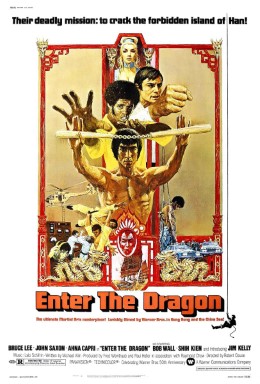
Enter the Dragon is a 1973 martial arts film directed by Robert Clouse from a story written by Michael Allin. It stars Bruce Lee, John Saxon and Jim Kelly. It was Lee's final completed film appearance before his death on 20 July 1973 at the age of 32. An American-Hong Kong co-production, it premiered in Los Angeles on 19 August 1973, one month after Lee's death.
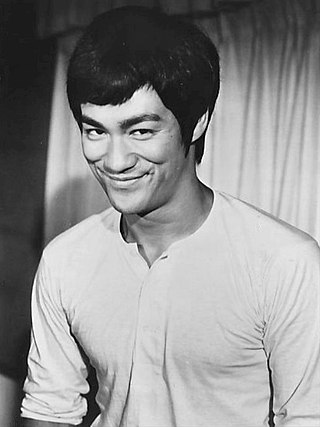
Bruce Lee was a Hong Kong-American martial artist and actor whose career spanned Hong Kong and the United States. He was the founder of Jeet Kune Do, a hybrid martial arts philosophy drawing from different combat disciplines that is sometimes credited with paving the way for modern mixed martial arts (MMA). Lee is considered by some commentators and martial artists to be the most influential martial artist of all time and a pop culture icon of the 20th century, who bridged the gap between East and West. He is credited with promoting Hong Kong action cinema and helping to change the way Chinese people were presented in American films.
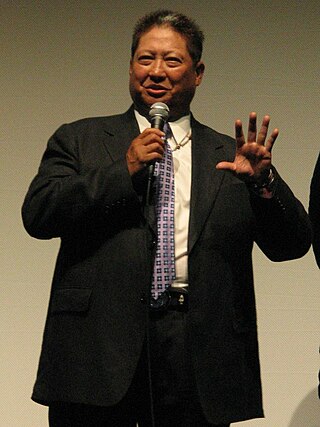
Samuel "Sammo" Hung Kam-bo is a Hong Kong actor, martial artist, film producer and director, known for his work in martial arts films, Hong Kong action cinema, and as a fight choreographer for other actors such as Jackie Chan.

Orange Sky Golden Harvest (OSGH) SEHK: 1132, previously known as Golden Harvest from 1970 to 2009, is a film production, distribution, and exhibition company based in Hong Kong. It dominated Hong Kong cinema box office sales from the 1970s to the 1980s, and played a major role in introducing Hong Kong action films to the world, especially those by Bruce Lee, Jackie Chan, and Sammo Hung.
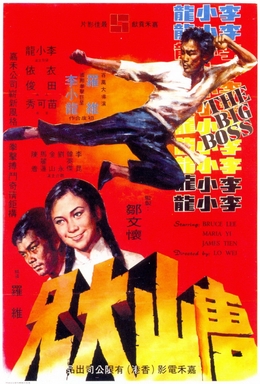
The Big Boss is a 1971 Hong Kong action martial arts film produced by Raymond Chow and starring Bruce Lee in his first major film in a lead role. The film also stars Maria Yi, James Tien, Tony Liu, and Nora Miao. Originally written for Tien, the leading role was given to Lee instead when the film's original director, Ng Kar-seung, was replaced by Lo. The film was a critical success and excelled at the box office. Lee's strong performance overshadowed Tien, already a star in Hong Kong, and made Bruce Lee famous in Asia and eventually the world.
The Game of Death is an incomplete Hong Kong martial arts film, filmed between August and October 1972, directed, written, produced by and starring Bruce Lee, in his final film project. Lee died during the making of the film. Over 100 minutes of footage was shot prior to his death, which was later misplaced in the Golden Harvest archives. The remaining footage has since been released with Lee's original Cantonese and English dialogue, with John Little dubbing Lee's Hai Tien character as part of the documentary titled Bruce Lee: A Warrior's Journey. Much of the footage that was shot is from what was to be the climax of the film.

Fist of Fury, also known as The Chinese Connection, is a 1972 Hong Kong action martial arts film written and directed by Lo Wei, produced by Raymond Chow, and starring Bruce Lee in his second major role after The Big Boss (1971). Lee, who was also the film's action choreographer, plays Chen Zhen, a student of Huo Yuanjia, who fights to defend the honor of the Chinese in the face of foreign aggression, and to bring to justice those responsible for his master's death.
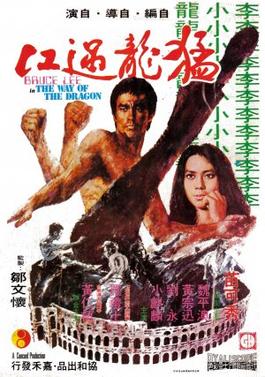
The Way of the Dragon is a 1972 Hong Kong martial arts action comedy film co-produced and directed by Bruce Lee, who also stars in the lead role. This is Lee's only complete directorial film and the last one released during his lifetime. The film co-stars Nora Miao, Robert Wall, Wei Ping-ou and Chuck Norris.
Chopsocky is a colloquial term for martial arts films and kung fu films made primarily by Hong Kong action cinema between the late 1960s and early 1980s. The term was coined by the American motion picture trade magazine Variety following the explosion of films in the genre released in 1973 in the U.S. after the success of Five Fingers of Death. The word is a play on chop suey, combining "chop" and "sock".
Bruceploitation is an exploitation film subgenre that emerged after the death of martial arts film star Bruce Lee in 1973, during which time filmmakers from Hong Kong, Taiwan and South Korea cast Bruce Lee look-alike actors ("Lee-alikes") to star in imitation martial arts films, in order to exploit Lee's sudden international popularity. Bruce Lee look-alike characters also commonly appear in other media, including anime, comic books, manga, and video games.

Raymond Chow Man-wai, was a Hong Kong film producer, and presenter. He was responsible for successfully launching martial arts and the Hong Kong cinema onto the international stage. As the founder of Golden Harvest, he produced some of the biggest stars of the martial arts film genre, including Bruce Lee, Jackie Chan, Sammo Hung, Jimmy Wang Yu, Cynthia Rothrock and Tsui Hark.

Betty Ting is a Taiwanese former actress who was mainly active in the 1970s. Ting is best known for being the center of international speculation regarding the untimely death of Bruce Lee in her apartment. Ting is credited with over 50 films.

The Shrine of Ultimate Bliss, also known as Stoner, A Man Called Stoner, and Hong Kong Hitman is a 1974 Hong Kong action film which was produced by Raymond Chow and directed by Huang Feng.
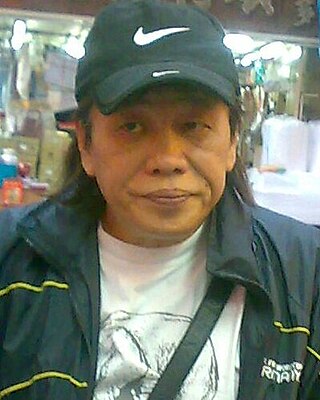
Bruce Liang is a Hong Kong martial artist and actor who has appeared in many Hong Kong martial arts movies. He often appeared billed as "Bruce Leung", "Bruce Liang", "Bruce Leong", or "Bruce Leung Siu-lung", and is thus generally grouped among the Bruce Lee clones that sprang up after Lee's death in the subgenre known as Bruceploitation.
Robert Clouse was an American film director and producer, known primarily for his work in the action/adventure and martial arts genres. He died on February 4, 1997, in Oregon of kidney failure.

This article details the filmography of actor and martial artist Bruce Lee.
James Tien is a Hong Kong retired actor. He appeared in almost 70 films, primarily in Hong Kong action cinema, including roles in the films of martial arts stars including Bruce Lee, Jackie Chan and Sammo Hung. He often played villains or supporting roles. He retired from the Hong Kong film industry in 1996.

When Taekwondo Strikes is a 1973 Hong Kong martial arts film directed and written by Feng Huang, and produced by Raymond Chow. The film is known for the collective martial arts experience of its cast and the high-quality fight choreography. The film stars an international cast of martial arts film actors, including Angela Mao, Jhoon Rhee, Anne Winton, Wong In Sik, Carter Wong, Kenji Kazama, Sammo Hung, Biao Yuen, and Golden Harvest producer Andre Morgan. This was Jhoon Rhee's only film, and Anne Winton's debut film.
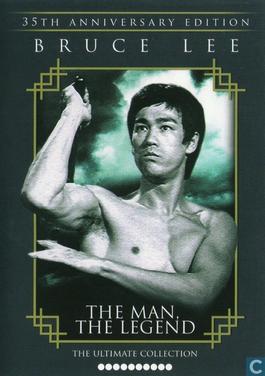
Bruce Lee, the Man and the Legend, also known as The Legend is Born of Bruce Lee and Year of the Dragon, is a 1973 Hong Kong documentary film, produced by Raymond Chow and starring Bruce Lee. A follow-up/reworking of this documentary was released in 1984 under the title Bruce Lee, The Legend.













